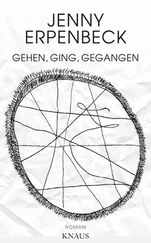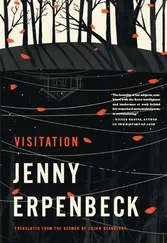Jenny Erpenbeck - The End of Days
Здесь есть возможность читать онлайн «Jenny Erpenbeck - The End of Days» весь текст электронной книги совершенно бесплатно (целиком полную версию без сокращений). В некоторых случаях можно слушать аудио, скачать через торрент в формате fb2 и присутствует краткое содержание. Год выпуска: 2014, Издательство: New Directions Publishing, Жанр: Современная проза, на английском языке. Описание произведения, (предисловие) а так же отзывы посетителей доступны на портале библиотеки ЛибКат.
- Название:The End of Days
- Автор:
- Издательство:New Directions Publishing
- Жанр:
- Год:2014
- ISBN:нет данных
- Рейтинг книги:4 / 5. Голосов: 1
-
Избранное:Добавить в избранное
- Отзывы:
-
Ваша оценка:
- 80
- 1
- 2
- 3
- 4
- 5
The End of Days: краткое содержание, описание и аннотация
Предлагаем к чтению аннотацию, описание, краткое содержание или предисловие (зависит от того, что написал сам автор книги «The End of Days»). Если вы не нашли необходимую информацию о книге — напишите в комментариях, мы постараемся отыскать её.
The End of Days — читать онлайн бесплатно полную книгу (весь текст) целиком
Ниже представлен текст книги, разбитый по страницам. Система сохранения места последней прочитанной страницы, позволяет с удобством читать онлайн бесплатно книгу «The End of Days», без необходимости каждый раз заново искать на чём Вы остановились. Поставьте закладку, и сможете в любой момент перейти на страницу, на которой закончили чтение.
Интервал:
Закладка:
One evening, after one day, there is no dinner on the table; when mother and daughter try to open the door to Grandmother’s room, it isn’t possible, because her body is lying in front of it. Vos iz mit dir? Mamele, vos iz mit dir? Mamele, what’s the matter? Simon the coachman is called, and he breaks open the door with an axe, with Mother standing beside him, one hand pressed to her mouth; her daughter calls her grandmother’s name, but no one answers.
What else have you got to do today?
I have a guest to look after.
Do you have a lot of guests?
Is the lonely soul not a guest in the body? Today it’s here, and by tomorrow it’s on its way again.
When the hole in the door is finally big enough, the two women stick their hands through, reaching for Grandmother, but she is already cold, as cold as only something dead feels.
23
At the many small, rectangular teller windows in the great hall at Ellis Island, a Loshel becomes a Louis, a Davnar a David, an Arden an Alvin, a Chaia a Clara. And he, Johann, becomes a Joe. Did he really want to go that far? And why is he doing this? Others learn at similar rectangular windows that their families will be permitted to stay here but they themselves must go back, or that because of them, the whole family will be sent back along with them, returning home to a place where they no longer want to make their home, where they’ll starve or be beaten to death. Then they start shouting or cling to one another, while others just stand there quietly, weeping or falling silent altogether.
24
Only after her grandmother’s funeral does her mother tell her that she, the daughter, took her very first steps holding her grandmother’s hand.
And where were you?
I was making all the preparations for us to move while also keeping the shop open.
No one was helping you?
No.
Why not?
We were moving in the wrong direction.
So a mother knows more about a child than a child could ever know about herself. If her own child were still alive, she, as the child’s mother, would surely have been the one to teach her how to put one foot in front of the other — and on some morning or other when her husband was at the office, the child, holding her hand, would have managed the journey from wardrobe to chest without falling for the first time ever, or if the weather were fair, perhaps the route would have led from the front door to the corner. As a mother, she would know this and never forget, and then one day she would perhaps tell her child, or perhaps not, with or without a reason. But now her secrets and memories are hers alone, and no one’s going to ask her, even many years later, about the things she keeps to herself. Her grandmother’s house, where, she’s just been told, she learned to walk, has now collapsed — she saw it herself not long ago. The roof crashed down into the parlor, turning what was formerly a room into a garbage heap. Chickens now mince about on the heap, poking the rotting thatch with their beaks on their chicken-life-long search for worms and bugs. If she were to remain in this town of modest size her whole life, she would, sooner or later, come out of a building that looks like any other and find herself right in front of her mother, or perhaps a neighbor or friend, even that would be enough. No, unable to find herself, she has no need to wait for others to give her up for lost. She’s already free down to her bones; already it’s a matter of complete indifference what she does.
With the same hands she used when she was learning to walk to hold tight to her grandmother so as not to lose her balance, she now packs a few necessities in a suitcase, carries it to the station, and pays for the ticket. In a second-class compartment she travels over rails whose maintenance used to be the responsibility of one who was called her husband in her earlier life, putting this leg of the journey behind her takes only an hour and twenty minutes; then she travels for an additional two hours, not getting out until Lemberg — capital of the Kingdom of Galicia and Lodomeria — ninety kilometers southeast of the small border town where she was first a girl, then a young woman, and then, for a brief period, even a mother and wife. She copies out an address from a notice hanging at the station, carries her suitcase there, pays half the first month’s rent in advance, presses down a door handle, and in this way enters her new lodgings. Here no one knows who held her hand when she learned to walk upright at only eleven months, nor does anyone know that the Poles are to blame for her inability to remember a father, nor even that she can still recite all of Goethe’s poem “The God and the Bayadère” by heart. Here she will use her right hand, and of course also her left, as well as her mouth and the other orifices of her body for no other purpose than to keep this body alive, along with the hands, the mouth, and the rest to which these orifices are attached. To be sure, she will do this under a new name — one that, in her opinion, seems reasonably appropriate to her new life, and if anyone asks her name, she says it’s Missy von Lemberg and laughs.
25
Admittedly, the Austro-Hungarian monarchy assembled almost as many different ethnic groups under its crown as he was seeing here in the great hall. From Bosnia to the most remote Polish-speaking provinces, the doors of a tobacco shop were invariably adorned with black and yellow stripes, with the Kaiser’s portrait occupying a place of honor on the wall. Yet, for all the intermingling of different languages and dialects, German remained the language of bureaucracy. The Kaiser, though, hadn’t selected the individuals to be let in; rather, he’d swallowed up entire peoples indiscriminately, making all of them part of his realm. Melancholia, madness, and unlawfulness remained at home — even after home became suddenly known as Austria or Hungary — and it did the monarchy no harm. Europe’s peoples, with or without wars, had always crisscrossed the continent, intermixing and seeking out new homes whenever their one bit of land produced too little or life became unbearable for some reason. But perhaps a coastline like this was a more naturally defined border. Here you could send the people you didn’t want back out on the water, even if it meant they would perish back home or simply drown at sea like surplus kittens.
26
For the first time ever she wishes she were of limited intelligence — limited enough that she might bring herself to call her daughter an ingrate. Her apartment now has so many spare rooms that it’s worth her while to rent them out. She gives up the shop, takes her leave of the farmers, and sells horse and cart to Simon, the coachman. She removes all personal items from the rooms and even clears out the cellar a little at a time, reasoning that in two or three years she may no longer have the strength for work like this. She now finally gives away many things that she intended to save although she had no plans for their use, such as the cradle in which her grandchild slept for eight months, the ivory toy with the little silver bells, even the woolen shawl she gave her daughter to wrap around her shoulders, which had never once been used, since her daughter hadn’t had the chance to go out for walks with her baby in the park. She keeps the footstool, for without it she can no longer reach the top shelf of her bookcase where volumes 1 to 20 of Goethe’s Collected Works still are and will remain, including Volume 9, which was struck by Andrei’s stone years before. (And so the bad memory remains preserved among the good, one as incorporeal as the others.) She also keeps her mother’s silver candelabra, it stands now on the windowsill in the parlor, but she never lights the candles on a Sabbath or on any other day.
Читать дальшеИнтервал:
Закладка:
Похожие книги на «The End of Days»
Представляем Вашему вниманию похожие книги на «The End of Days» списком для выбора. Мы отобрали схожую по названию и смыслу литературу в надежде предоставить читателям больше вариантов отыскать новые, интересные, ещё непрочитанные произведения.
Обсуждение, отзывы о книге «The End of Days» и просто собственные мнения читателей. Оставьте ваши комментарии, напишите, что Вы думаете о произведении, его смысле или главных героях. Укажите что конкретно понравилось, а что нет, и почему Вы так считаете.












